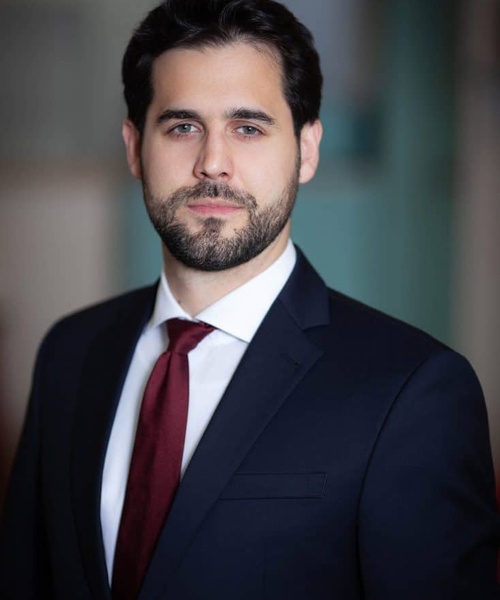
Josip Konjevod
I graduated with a Master in Law from the University of Zagreb Faculty of Law in 2007 and started working as an associate at a law firm. After three years of compulsory practice as a legal associate, I passed the bar exam, got admitted to the bar in 2010, and started a small law firm with my colleague, Tomislav Valicevic.
I have been practicing law ever since, and in the meantime, I established a cooperation with a Viennese law firm which specializes in corporate law. Leaving my job and starting a private practice was an overnight transformation from an employee to an entrepreneur, a role which I was clearly not prepared to take. The beginning was extremely challenging—the hardest “test” I’ve ever taken. Later, still in constant pursuit of new challenges, I decided to get an international degree from a prestigious university outside my country. Going to Madrid and Chicago was much more than getting a degree and advancing in my professional career; it was a dream come true. Making it all the way here was confirmation that our law firm is going in the right direction, and it will go down as a success for my whole team.

"Strategy, planning, and the improvement of work processes are now embedded in my professional mindset."
What made you decide to do the Executive LL.M. at IE?
Despite having 12 years of professional experience in the field of law, I felt I did not have the skills required to take my business to the next level.
Law school prepared me to practice law, but that’s just one aspect of conducting a successful business. Most of the time, I learned from my mistakes the hard way, as I didn’t have any significant knowledge in finance, marketing, organization, strategy, or, most importantly, in managing people. I felt I was falling behind and needed further education to stay competitive in the dynamic legal market.
My motivation for enrolling in the LL.M. at IE was to enhance and broaden my perspective beyond pure legal concepts, and to help myself better develop and understand a business point of view on legal matters. Sometimes legal and business topics are at odds, so enhancing my knowledge of business fundamentals will allow me to be involved in key strategic decisions and advice for my clients. My objective is also to diversify my role and allow it to be more multifaceted. Through this course, I can analyze my decisions—not just from a legal perspective, but also from a commercial and strategic viewpoint, for optimal efficiency and growth of the business.
What has been the most important project in your career?
The most important project in my career was starting a law firm at the age of 26. Starting from zero, without any clients or equity, proved to be the best life lesson I could have gotten. I learned the hard way how versatile and well-rounded you need to become in order to attract clients, grow your business, stay on the market, and, most importantly, recognize and keep talented employees so that the company is structured around them.
What stands out about your experience (both professionally and personally) at IE Law School? Are there any stories you’d like to share?
IE Law School is a truly invaluable experience, both professionally and personally. The people I met and the friendships I made are precious, lifelong capital I am taking home with me. The school played a big role in making this happen by carefully selecting students with different background but common values.
What was the most valuable lesson you learned in the master’s program that you apply to your professional life today?
The most valuable lesson I learned in this program is that law on diminishing returns is not applicable to education and investment in personal relationships. This program requires significant commitment, both financially and time-wise, but the benefits and personal growth you experience outweigh all costs by a wide margin. The more you invest, the more you get back, so one must never stop learning and pursuing new ventures. Perhaps it is a bold statement, but I would say that joining the program was a turning point in my career.
What are the key takeaways from your experience at Northwestern Pritzker School of Law?
The US style of teaching, where you have highly engaged professors using lots of practical examples rooted in opinions of judges, was a big shift from the strict European ex cathedra methodology. The judicial branch in the US tackles problems and addresses societal issues much faster and with more understanding of the rapidly changing world. Statutes and acts in the US are merely guidelines for judges, who make decisions that place the highest emphasis on the free market and freedom of individuals.
What did you learn from the experience at Northwestern?
Case-method studying requires a deep understanding of the problem. It forces students to identify the cause, fully grasp the facts of the case, and understand the underlying laws and consequences of both the behavior that triggered the case and the judicial response to it. That being said, I learned how to approach the case or issue from various angles, using both legal and economic arguments and focusing on problem-solving rather than knowing the letter of the law.
What skills and knowledge have you acquired since doing the master’s program?
Strategy, planning, and the improvement of work processes are now embedded in my professional mindset. Furthermore, I now recognize business opportunities in practice areas that were completely unknown to me before I joined the program. Moreover, my work focus has slightly shifted from being operational and doing pure legal work on a day-to-day basis, to making business trajectories, recognizing what the market might need in the future, and making sure we’re following market trends. In a way, finishing the master’s program is a new beginning for me, and I have a long road ahead. I am trying to delegate more work to my associates and pass the knowledge on to them so that they can also grow and see their future in our firm.
What opportunities arose during your time at IE Law School, and what do you currently do?
During my time at IE Law School, I initiated several projects with colleagues that I met in Chicago and Madrid. Because of the diverse backgrounds of my fellow students, business opportunities arose in regions that I could have never imagined before joining the program. Due to national limitations of the legal profession, my work was mostly domestic and regional. Now, I am much more internationally exposed.
What are your plans after the master?
My midterm plans after the master will be to scale up my business and perhaps expand into the regional market. That leaves some space for me to perhaps pursue additional educational programs at IE.